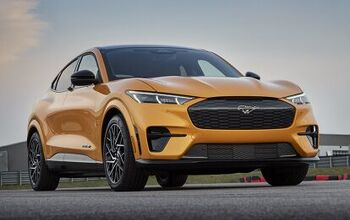Saudi Arabia Latest To Fleet-Average Fuel Economy Mandate Party
As in the United States, Europe and Japan, Saudi Arabia is now mandating new vehicles be more fuel efficient. Like the U.S., however, the Saudis will put the onus on the automakers without raising a cent on fuel prices.
Green Car Reports says as part of the 2012 Saudi Energy Efficiency Program, new vehicles on sale will receive a fuel economy label beginning in August, followed in late 2016 with a mandate to follow fleet-average targets; the target for 2020 is 28.2 miles per gallon, lower than the 40 mpg mandate for that year in the U.S.
The reason for all of this is because energy use in the kingdom is rising at a rate of 4 percent to 5 percent annually as a result of economic growth, though the increases are outpacing said growth.
Other proposals include the possibility of a Cash For Clunkers program, temporary mass transit solutions until permanent transit offerings open to the public, and improvements to heavy-duty vehicles such as aero and no-idling mandates.
Seattle-based writer, blogger, and photographer for many a publication. Born in Louisville. Raised in Kansas. Where I lay my head is home.
More by Cameron Aubernon


































Comments
Join the conversation
Interesting paradox, 40% of all cars sold in the Gulf (from memory) are SUVs. Gasoline is cheap, and much cheaper than diesel which is expensive by local standards, and so high in sulfur content that most "clean" modern diesel engines will see their fuel pumps fail at 60,000 km. Diesel in the Gulf is a commercial fuel that is also regulated in some markets (special authorization is required to buy it in some towns as there is a tight supply). Anyhow, diesel is not the way to go to lower your "CAFE" in this Region. Customers simply won’t buy diesel vehicles. Turbocharged small displacement engines are also frowned upon as the temperature in the Region throws volumetric efficiency out of the window. Also, the standard of driving in Saudi/Region means that if you can afford it you must buy a large SUV for "protection." Cheap fuel is perceived as a right in Saudi. Increasing fuel price in that market will be a hard task for the Govt. People won't be pleased. A lot of car manufacturers and Saudi Importers make a lot of money by selling fat margin SUV or big engine cars in Saudi and the Gulf. It would be interesting to see if this will be applied to the whole region under the GSO (Gulf Standard Organization) mandate. Maybe this is an opportunity for Hybrids to start selling in the Gulf? However, good luck making them an acceptable product for Gulf Customers. How will the vehicles react to 113F+ heat and having the A/C on the year round? Lexus has been selling the LS460 in the Region (from memory less than a 100 units per annum ) with limited success and Chevy testing the Volt for a couple of year but not commercialized it, yet. I guess you cannot fight progress, though.
114F !! Can't imagine the stress applied to the vehicle's components under that scenario. I read that Saudi Arabia's reserves are dwindling. Unlike some of its smarter neighbors (hello Dubai!) which have invested heavily for a post- peak oil economy, the Saudis are dependent on oil revenue. They may want to extend their reserves for export, rather than being consumed domestically. But it will be difficult. Like Venezuela and other oil rich countries, gasoline costs less than bottled water, and it is almost a God-given right.
On I-74 heading to Indianapolis a couple weeks ago, stopped at a Wendy's and saw a similar LC. When it was pulling in, my first glance thought was "Old Montero." But I looked again and it was a 2-door LC, in RHD configuration. I thought about asking the guy the story on it, but 1) he didn't look friendly, and 2) he didn't wash his hands after using the restroom. So I was all STRANGER DANGER.